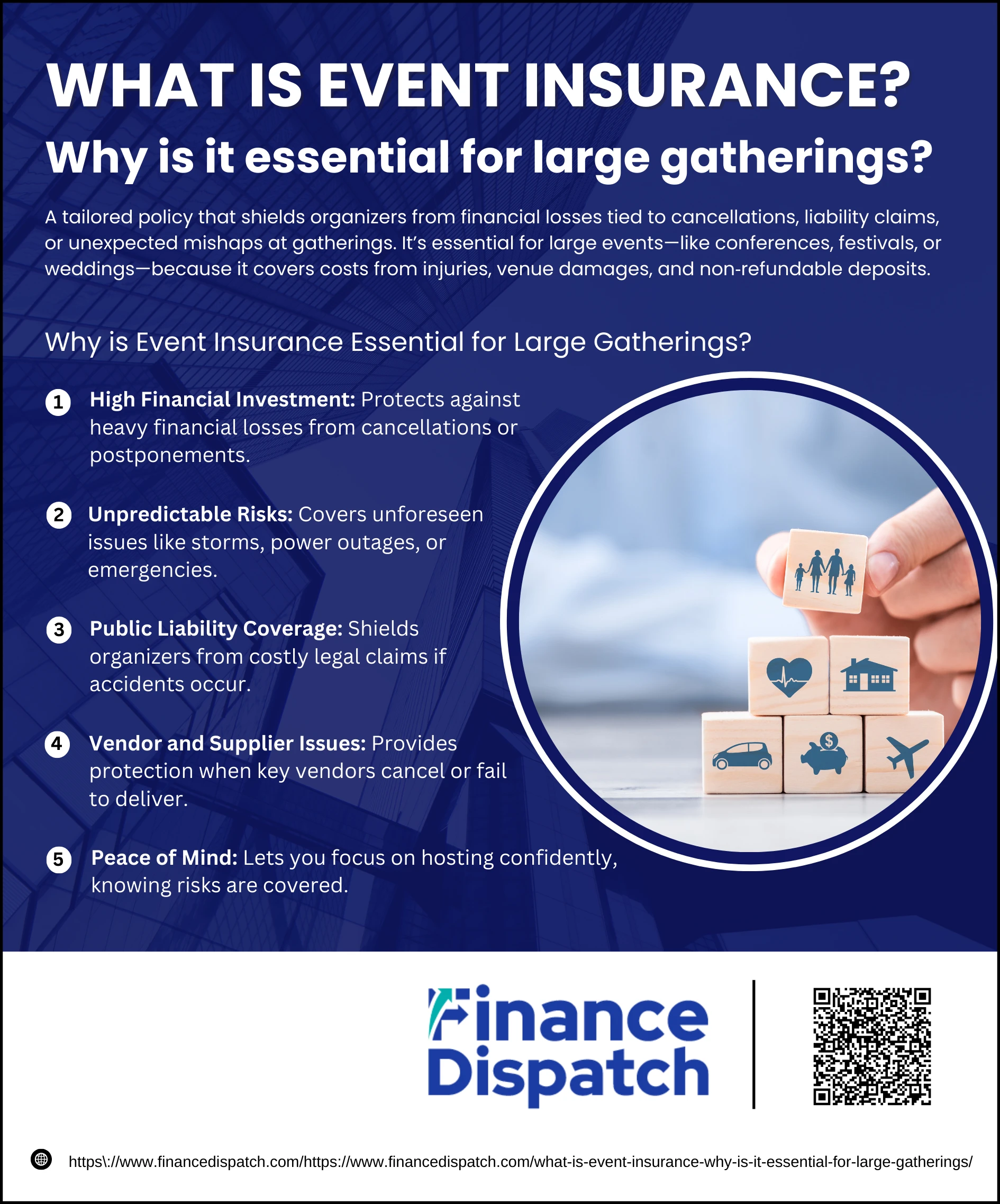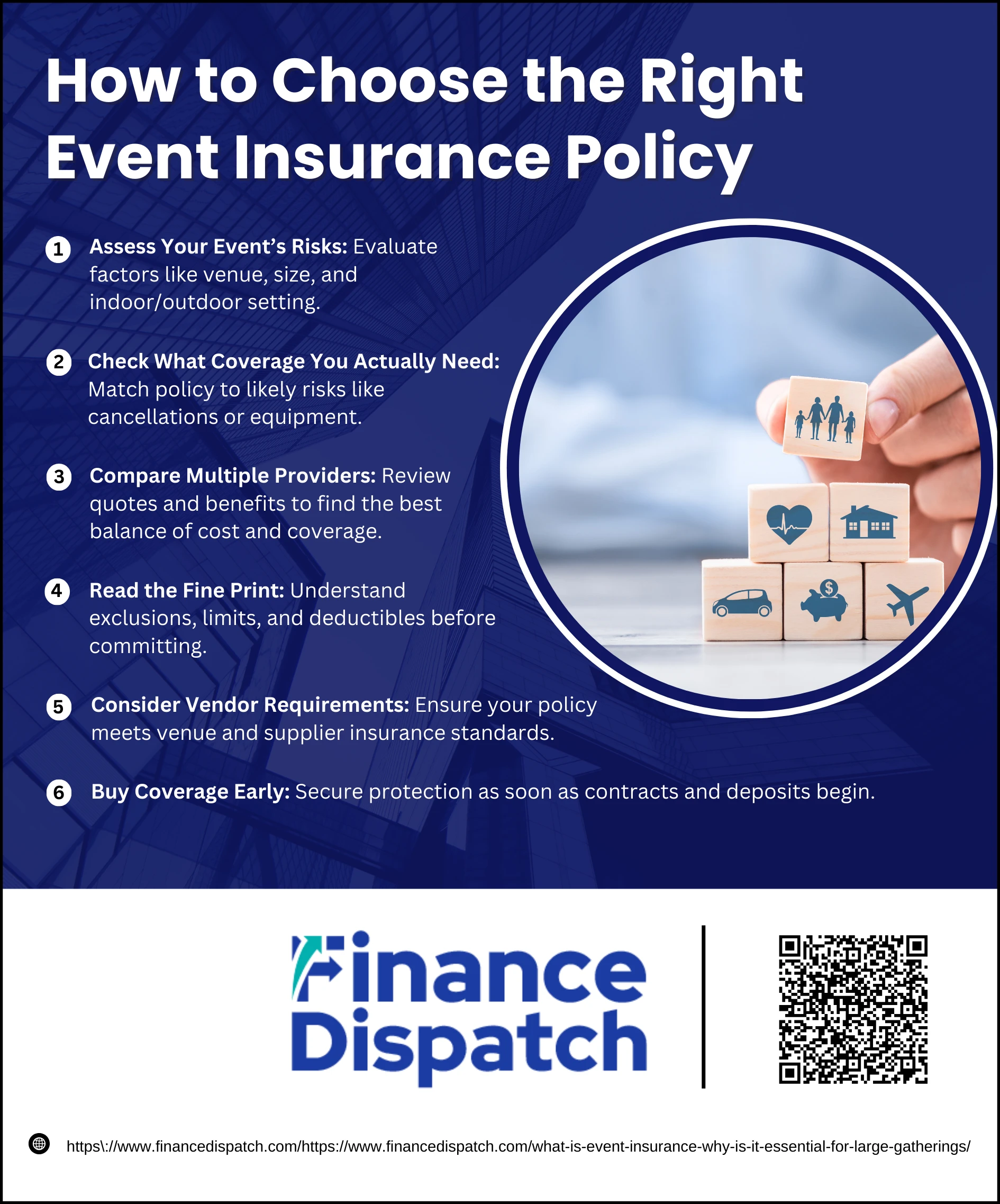When you’re planning a big event—whether it’s a wedding, music festival, corporate conference, or community fair—there’s always an element of uncertainty. A sudden storm, a last-minute vendor cancellation, or even an unexpected accident could throw everything off course. That’s where event insurance comes in. It acts as a financial safety net, protecting organizers and hosts from potential losses that arise when things don’t go as planned. In a world where large gatherings involve significant investments and countless moving parts, event insurance isn’t just an option—it’s an essential safeguard for peace of mind.
What is Event Insurance?
Event insurance is a specialized type of coverage designed to protect organizers, hosts, and even participants from financial losses caused by unexpected problems during an event. It acts much like a safety net, stepping in when issues such as cancellations, postponements, property damage, or liability claims arise. Whether it’s a wedding, corporate seminar, concert, or community festival, event insurance helps ensure that the money, time, and effort invested don’t go to waste if things don’t go as planned. In simple terms, it gives you the confidence to focus on creating a successful gathering without the constant worry of unforeseen risks.
 Why is Event Insurance Essential for Large Gatherings?
Why is Event Insurance Essential for Large Gatherings?
Large gatherings are exciting opportunities to celebrate, connect, or showcase something important, but they also come with bigger risks. From unexpected weather changes to last-minute cancellations, even small disruptions can turn into major financial and legal challenges. Event insurance acts as a protective layer, ensuring that no matter what happens, your investment and reputation are safeguarded.
1. High Financial Investment
Organizing a large event often requires significant spending on venues, catering, staging, lighting, entertainment, and staff. If something forces you to cancel or postpone, those expenses can quickly become heavy losses. Event insurance helps recover part or all of those costs, so your finances don’t take the full hit.
2. Unpredictable Risks
No matter how carefully you plan, some factors are simply beyond your control. A sudden storm can ruin an outdoor festival, a power outage may halt a conference, or a health emergency could disrupt a wedding. With event insurance, you are financially protected against these unforeseen disruptions, reducing stress and potential setbacks.
3. Public Liability Coverage
When large groups of people gather, accidents can happen—guests might slip and fall, or equipment could cause damage to the venue. In such cases, you could be held legally responsible. Liability coverage within event insurance takes care of legal fees and compensation claims, shielding you from costly lawsuits.
4. Vendor and Supplier Issues
Big events depend heavily on third-party vendors like caterers, florists, photographers, and performers. If one of them cancels unexpectedly or fails to deliver, it can derail your entire program. Event insurance can cover financial losses linked to vendor failures and help pay for last-minute replacements.
5. Peace of Mind
Perhaps the most valuable benefit of event insurance is the peace of mind it offers. Knowing you’re covered allows you to focus on creating a memorable and enjoyable experience for your guests, instead of worrying about what might go wrong. It gives you confidence to plan boldly, knowing you have a safety net in place.
Common Situations Where Event Insurance Helps
Even with the most careful planning, unexpected challenges can arise during an event. From sudden weather changes to last-minute cancellations, these issues can not only disrupt the occasion but also lead to significant financial losses. Event insurance steps in as a safety net, covering many of these risks and ensuring your event doesn’t become a financial burden.
Common Situations Where Event Insurance Helps
1. Weather Disruptions – Heavy rain, storms, or extreme heat can force outdoor events like concerts or weddings to be canceled or postponed.
2. Venue Problems – If your chosen venue becomes unusable due to fire, flooding, or double booking, insurance can help cover the costs of securing an alternative.
3. Vendor Cancellations – When key suppliers such as caterers, entertainers, or photographers back out at the last moment, insurance helps recover costs or arrange replacements.
4. Injury or Accidents – If a guest is injured or property is damaged during the event, liability coverage protects against legal and medical expenses.
5. Equipment Damage – Expensive rentals like sound systems, lighting, or staging can get damaged; insurance ensures you don’t pay the full replacement or repair costs.
6. Event Cancellation or Postponement – Unexpected emergencies, from a family tragedy to a local disaster, may force you to cancel or reschedule, and insurance helps cover lost expenses.
Types of Event Insurance Coverage
Not all event insurance policies are the same—coverage depends on the type of risks you want to protect against. Whether it’s safeguarding against cancellations, equipment damage, or guest accidents, different types of event insurance can provide tailored protection. Understanding these options helps you choose the right coverage for your gathering.
1. Cancellation or Postponement Coverage
Sometimes, despite all the planning, events have to be canceled or delayed due to circumstances outside your control—like extreme weather, illness, or emergencies. This coverage helps reimburse you for non-refundable deposits and other financial losses.
2. Public Liability Insurance
With large gatherings, there’s always a chance of accidents. If a guest trips, gets hurt, or property is damaged, liability insurance covers medical expenses and legal claims, protecting you from costly lawsuits.
3. Property and Equipment Insurance
Events often involve expensive rentals such as audio systems, lighting, or décor. If these items are damaged, lost, or stolen, property and equipment insurance ensures you don’t have to pay the full replacement or repair costs out of pocket.
4. Weather Insurance
Outdoor events are especially vulnerable to unpredictable weather. If heavy rain, storms, or other severe conditions force you to cancel or move the event, this coverage compensates for financial losses linked to the disruption.
5. Vendor Insurance
Your event’s success often depends on vendors like caterers, florists, photographers, or performers. If one of them fails to deliver or cancels at the last minute, vendor insurance helps cover replacement costs and related losses.
How Much Does Event Insurance Cost?
The cost of event insurance can vary widely depending on the size, type, and risks associated with your gathering. A small birthday party may only need minimal coverage, while a large concert or corporate conference with thousands of attendees will require more comprehensive protection. Factors like the number of guests, location, duration, and the types of coverage selected all influence the final premium.
Average Costs of Event Insurance
| Event Type | Typical Cost Range | Coverage Usually Includes |
| Small Private Parties (e.g., birthdays, anniversaries) | $75 – $150 | Basic liability coverage, minimal cancellation protection |
| Weddings | $150 – $500 | Cancellation/postponement, vendor issues, liability |
| Corporate Events (e.g., seminars, conferences) | $200 – $1,000+ | Liability, property/equipment damage, cancellation |
| Outdoor Festivals | $300 – $2,000+ | Weather coverage, vendor failures, public liability |
| Concerts & Large Gatherings | $500 – $5,000+ | Extensive liability, property, weather, and cancellation |
When Do You Need to Buy Event Insurance?
Timing is just as important as choosing the right type of coverage. Buying event insurance too late might leave you exposed to risks that arise before the policy is in place. Ideally, you should secure coverage as soon as you start making financial commitments—like booking a venue or hiring vendors—so you’re protected from the very beginning.
When Do You Need to Buy Event Insurance?
1. Right After Booking the Venue – Protection starts in case something happens that forces cancellation before the big day.
2. When Signing Vendor Contracts – Covers risks if a caterer, photographer, or entertainer backs out or fails to deliver.
3. For Outdoor Events in Weather-Prone Seasons – Extra important if your event takes place during rainy, stormy, or unpredictable months.
4. If the Event Involves Large Crowds – Liability coverage becomes crucial when there’s a higher chance of accidents or property damage.
5. When the Budget is Substantial – The more money you invest, the greater the need for financial protection.
6. Before Sending Invitations or Selling Tickets – Ensures refunds or rescheduling costs are covered if something unexpected happens.
 How to Choose the Right Event Insurance Policy
How to Choose the Right Event Insurance Policy
With so many options available, selecting the right event insurance policy can feel overwhelming. The key is to match the coverage to the unique needs of your gathering—whether it’s a wedding, a corporate conference, or a large outdoor festival. By carefully evaluating a few important factors, you can find a policy that offers both adequate protection and peace of mind.
1. Assess Your Event’s Risks
Every event comes with its own set of risks. A wedding in a banquet hall is different from a music festival in an open field. Consider the number of guests, the venue type, and whether your event is indoors or outdoors. Outdoor events are especially vulnerable to weather-related disruptions, while larger gatherings naturally increase the chances of accidents or property damage.
2. Check What Coverage You Actually Need
Not every event requires the same type of protection. For example, if you’ve invested heavily in décor and equipment rentals, property coverage will be essential. If you’re worried about potential cancellations or postponements, cancellation insurance should be a priority. Think about what could realistically go wrong and choose coverage that directly addresses those risks.
3. Compare Multiple Providers
Insurance premiums and coverage terms vary widely from one provider to another. Don’t settle for the first policy you find. Instead, gather quotes from at least two or three different insurers, and compare not only the cost but also what each plan includes. Sometimes, a slightly higher premium can offer broader protection and better claim support.
4. Read the Fine Print
Many event organizers skip the policy details, only to find out later that their claim isn’t covered. Carefully review exclusions, coverage limits, and deductibles before committing. Pay attention to specific clauses about weather, cancellations, or liability claims, and make sure the policy doesn’t leave out key protections you need.
5. Consider Vendor Requirements
Some venues and vendors have their own insurance requirements. For example, a hotel ballroom may require you to carry a certain amount of liability coverage to host an event on their property. Always check with your venue and major vendors before purchasing a policy, so you can ensure your insurance meets their standards.
6. Buy Coverage Early
Waiting until the last minute to purchase insurance can leave gaps in coverage. If something happens after you’ve booked a venue but before you buy insurance, you won’t be protected. The best practice is to purchase coverage as soon as you start signing contracts and making deposits, usually at least 30–60 days before the event.
Common Exclusions & Misconceptions about Event Insurance
While event insurance offers valuable protection, it’s important to understand that it doesn’t cover everything. Many organizers assume that once they buy a policy, every possible risk is included—but that’s not always the case. Knowing the common exclusions and clearing up misconceptions will help you set the right expectations and avoid surprises when it’s time to make a claim.
1. Pandemics or Epidemics – Most standard policies do not cover cancellations caused by widespread health crises unless specifically added as an extra rider.
2. Known Circumstances – If you buy insurance after a storm warning or a vendor already shows signs of financial trouble, the policy usually won’t cover it.
3. Poor Attendance – Insurance won’t reimburse you for fewer guests showing up due to lack of interest or marketing issues.
4. Intentional Acts or Negligence – Damage caused on purpose or by reckless behavior is excluded from coverage.
5. “Everything is Covered” Myth – A common misconception is that event insurance protects against all losses. In reality, it only applies to situations outlined in the policy.
6. Last-Minute Purchases Guarantee Coverage – Buying insurance just days before the event may not protect you from issues that are already foreseeable.
7. Vendor Insurance Equals Full Protection – Some assume vendor liability covers the entire event, but it only applies to that vendor’s services, not your whole gathering.
Conclusion
In the end, event insurance provides more than just financial protection—it offers peace of mind. Whether it’s a wedding, corporate conference, festival, or community gathering, unexpected risks can quickly turn a special occasion into a stressful and costly setback. By understanding what event insurance covers, what it doesn’t, and how to choose the right policy, you can plan with confidence knowing you’re prepared for the unexpected. Investing in coverage is not just about safeguarding money—it’s about ensuring your event runs smoothly and your memories remain positive, no matter what challenges arise.



